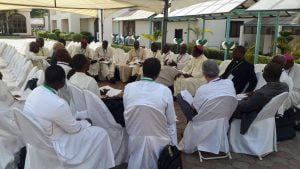
RESOLUTIONS OF RECOWA-CERAO PLENARY:
We the Bishops of RECOWA-CERAO met for the 2nd Plenary of our Association from February 22-29th, 2016 under the theme; The New Evangelisation and the Specific Challenges for Church, Family of God in West Africa: Reconciliation, Development and Family Life. After discussions and prayers, we have adopted the following Resolutions:
1: Congratulations to ECOWAS:
We rejoice and congratulate the President of Economic Community of West Africa, ECOWAS, Mr. Macky Sall and the entire members of the family on the occasion the 40th anniversary of the foundation of the organisation. While assuring them of our prayers, we commend the vision of the founding fathers of the Association and call on all our leaders in the region to intensify the quest for the consolidation of democracy, justice and peace in our region.
2: The Church and its Mission of Evangelisation:
We rededicate ourselves to the mission of evangelisation bearing in mind that this is the primary mission of the Church. In doing this, we are committed to following through the words of our Lord and Saviour Jesus Christ who came to serve and not to be served(Mt. 20:28). In fulfilling this mission, we seek partnership with the governments of our region to ensure a better life for our people.
3: Political Developments and Democracy in our Region:
Since our last meeting, there have been positive developments in our region. Despite enormous difficulties, we have witnessed some progress on the political front. Wars have largely ended in most of our countries. We pledge our commitment to deepening Democracy and its ideals of justice and development among our people. We continue to demand our political leaders to seek power by free and fair means and to imbibe the culture of tolerance and respect for the rule of law and due process.
4: Insurgency and the rise of Religious Extremism:
We note with sadness the ugly face of extremism and the rise of violent extremist groups among our countries. The violence of Boko Haram and other extremists groups in our region and beyond, have left serious wounds and fractures on our people. However, we commend the government of Nigeria and the regional governments who have rallied around to eliminate this terrible cancer which has destroyed our communities. There is still a lot to be done, but we are committed to uniting with our respective governments to ensure the return of peace among our people.
5: Imperative of Dialogue of Faith and Advocacy:
In the face of these challenges, both Ecumenical and Interreligious forms of Dialogue have become an imperative among the faith communities. We note the tremendous work that religious leaders in the region have done sometimes at great risks. In the last few years, we have witnessed increased fear, suspicion and anxiety among our various religious groups. We resolve to further intensify our efforts towards ensuring that religion becomes an instrument of peace and not war. In doing this, we also resolve to pursue advocacy as a strategy for highlighting policies that create divisions among our people.
6: Politics as a tool for Development, Peace and Justice:
We note that our people are still vulnerable to the excesses of warlords, warmongers and political thugs. Corruption and dictatorship continue to dehumanize and degrade our people, making development impossible and crisis inevitable. With its imperfections, we believe that Democracy holds the key to integration among our people. Our politicians must learn to respect the wishes of our people while shunning ostentatious lifestyles that further alienate the electorate. We resolve to continue to encourage our people to use Democracy to build bridges for the attainment of justice and peace.
7: Traditional and Cultural means of Conflict Management:
The Church remains committed to being an instrument of peace. We note with great concern the fact that many years after the end of wars, many of our communities are still hurting and nursing unhealed wounds. We encourage our people to explore more traditional means of conflict resolution and consensus building. Towards this end, we resolve to further explore these means and encourage our governments and faith communities to use them where possible.
8: The Family as a school for Peace and Reconciliation:
We note that the family has come under very severe strain and pressure from the forces of modernity especially in the face of our endless crises. We therefore resolve to ensure that the family becomes the focus of our apostolate. Towards this, we must encourage our people to appreciate that harmony in the family offers us the best hope for peace in our societies, communities and nations.
9: The Youth, our Future:
With over 65% of our population made up of young people, we are resolved to ensure that they become our greatest investment. We call on our governments to harness the talent of our youth by creating the necessary environment for them to thrive. We note that under the illusion of the search for a better life, we have lost hundreds of our youth to untimely deaths in the high seas while others remain stranded in the borders and camps around Europe. We resolve to intensify our efforts towards turning the minds of our youth away from the crimes of human trafficking and illegal migration, violence and drugs so as to make them agents of peace and reconciliation.
10: The Year of Mercy:
We note with joy and hope the fact that last year, His Holiness Pope Francis declared the Year of Mercy. Amidst the violence and conflict in our families, communities and nations, we call on our people to renew their faith in our common humanity. Let us use this period to highlight the message of our Lord and Saviour Jesus Christ, the Prince of peace and the full expression of the Mercy of God. May God, the father of Mercy grant us forgiveness and ensure genuine reconciliation among our people.

